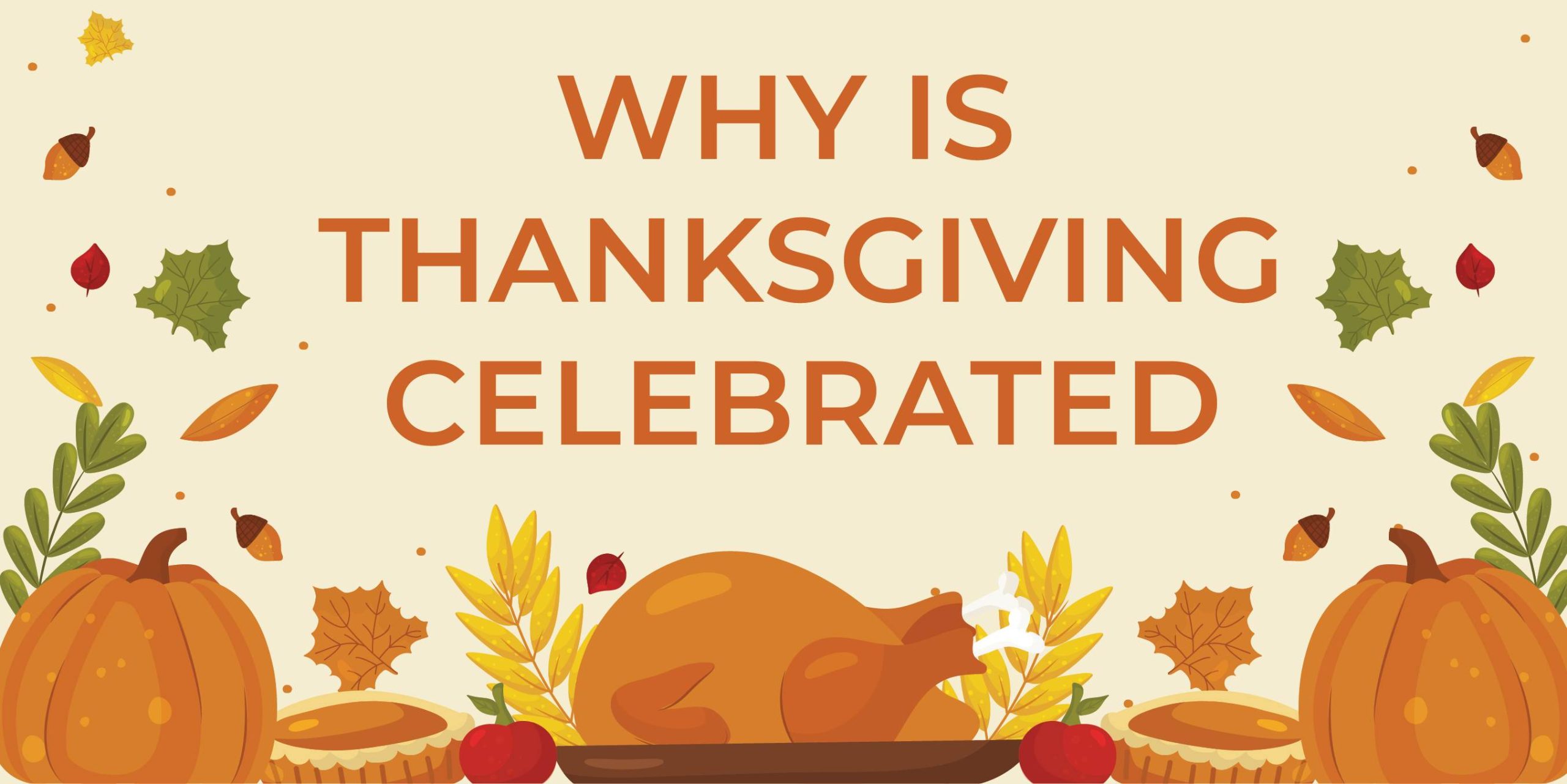Thanksgiving is celebrated to express gratitude and thankfulness for the blessings of the past year, particularly the bountiful harvest. It’s a time for people to come together, whether with family or community, to share a festive meal and appreciate the good things in life. Also, in this article, we will understand Why is Thanksgiving celebrated? Additionally its history, traditions, and also its meaning in Bible.
What’s The History of Thanksgiving
In 1621, Plymouth colonists and Wampanoag Native Americans shared one of the first Thanksgiving celebrations. Another Thanksgiving was held in 1623, to mark the end of a severe drought. Also, the practice of fasting made Thanksgiving a common practice in New England settlements.

In 1863, President Abraham Lincoln proclaimed a national Thanksgiving Day during the Civil War. This is celebrated on the final Thursday of November. This tradition continued until 1939 when Franklin D. Roosevelt moved the holiday a week earlier to boost retail sales during the Great Depression. New York was the first state, in 1817, to officially adopt an annual Thanksgiving holiday. Although states celebrated it on different days, the American South remained largely unfamiliar with the tradition.
5 Thanksgiving Traditions Around The World
Come let’s understand why is Thanksgiving celebrated, what Thanksgiving Day means to people in different countries, and when Thanksgiving is celebrated in each of these countries.
1. America
Of all the celebrations from around the world, America’s Thanksgiving is the most popular of them all. It marks the beginning of the winter American holiday season until the New Year celebrations. American Thanksgiving was first celebrated by the Pilgrims in 1624 to commemorate their first successful harvest. It was the then President Abraham Lincoln who proclaimed a national Thanksgiving Day that was to be held every November. A typical American celebration includes a grand Thanksgiving dinner with family and friends. Other highlights of American traditions include parades through the streets of New York, Broadway shows, and football matches.
2. Canada
Canadian Thanksgiving, which predates the American holiday by almost 40 years, has its origins dating back to 1578. It’s similar to the American celebration, featuring a festive meal with turkey, mashed potatoes, sweet potatoes, cranberry sauce, and Brussels sprouts. Additionally, watching the nationally televised football doubleheader known as the Thanksgiving Day Classic is a popular way to spend the holiday in Canada.
3. Brazil
Brazil’s Thanksgiving, known as Dia de Ação de Graças, resembles American celebrations and is a day for expressing gratitude for the harvest. Though not an official national holiday, it’s observed by some Brazilians and many American expatriates, featuring a traditional feast with turkey, corn stuffing, pumpkin pie, and sweet mashed potatoes.
4. Japan
In Japan, the Day of celebration is known as ‘Kinro Kansha no Hi,’ or Labor Thanksgiving Day. It’s a day to express gratitude for the hard work of dedicated workers and always falls on November 23rd. The focus is less on food and more on thanking those who keep the community safe, such as firefighters, police officers, and coastguards. Schoolchildren prepare handmade cards and gifts to distribute to these essential workers, and the holiday provides an opportunity for people to take a break from their busy schedules and spend quality time with their families.
5. India
Thanksgiving is celebrated in various ways and under different names across India due to its diverse culture. In Goa, it’s known as ‘Ladin’ or ‘Ladainha’ and is celebrated in late November with hymns and prayers. In southern India, Pongal is celebrated in January, marked by the first harvest and sweet dishes. Punjab celebrates Lohri as a harvest festival to express gratitude for God’s provisions and blessings, hoping for happiness and prosperity in the coming year.
What Does Thanksgiving Mean in the Bible?
Thanksgiving, as it is commonly understood today, is not explicitly mentioned in the Bible as a specific holiday or practice. Then why is Thanksgiving celebrated? However, the concept of giving thanks to God is a central theme throughout the Bible, and there are numerous references to thanksgiving, gratitude, and praise to God in both the Old and New Testaments. Here are some key biblical principles related to Thanksgiving:

- The Bible encourages believers to be thankful and express their gratitude to God for His blessings, provisions, and grace. Songs of Thanksgiving and praise are filled in The Book Of Psalms.
- Many biblical passages describe the act of giving thanks as an essential part of worship and prayer. This includes offering prayers of thanksgiving when making requests to God (Philippians 4:6) and singing hymns and songs of thanksgiving (Colossians 3:16).
- In the Old Testament, there were festivals like the Feast of Tabernacles (Sukkot) and the Feast of First Fruits that involved giving thanks to God for the harvest and His provision.
- In the New Testament, thanksgiving is often linked to the gratitude Christians feel for their salvation through faith in Jesus Christ. The Apostle Paul frequently expressed thanksgiving for the faith and love of the believers he ministered to.
- In the context of the Lord’s Supper or Communion, Christians are encouraged to remember and give thanks for the sacrifice of Jesus Christ, who actively gave His life for the forgiveness of sins.
Let’s Celebrate Harvesting With Gratitude
After understanding why is Thanksgiving celebrated, let’s cherish a holiday that transcends mere feasting and festivities. It serves as a reminder to pause and reflect on the many blessings in our lives. As we gather with loved ones and share meals, we can also share gratitude, love, and togetherness with unique Thanksgiving favors. Explore mythanksgivingshirts for keepsakes and lasting memories.

